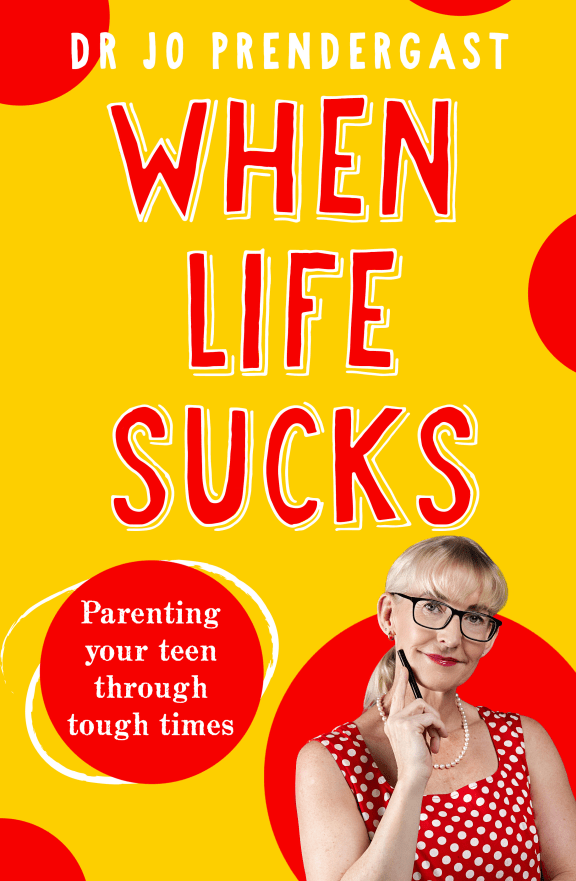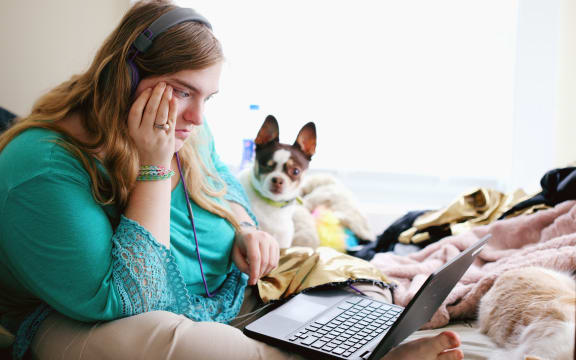
It might seem that they pay more attention to their phones than to their family, but teenagers need their parents says Christchurch psychiatrist and author Jo Prendergast. Photo: Creative Christians / Unsplash
Parenting teenagers can feel like a bit like running a fully serviced hotel and taxi service, but a supportive home base is crucial says a Christchurch psychiatrist and author of a new parenting guide.
Jo Prendergast, who also moonlights as a stand-up comedian, says parents need to be hyper-aware of subtle signals that teenagers want to recharge at home and connect with them.
She told Nine to Noon that teenage brains are a mixed bag of vulnerability and resilience, likening them to the 1962 VW Beetle she drove as a student, “all revving engine and accelerator working well, but pretty dodgy brakes and gears”.
“They have a well-developed emotional centre and reward and pleasure centre so they feel emotions much more intensely. Unhelpful ways of dealing with stress are more rewarding, so things like drug and alcohol use or reckless behaviour really light up the reward centre and the teenage brain.”
That means teenagers are more vulnerable to stress, she says.
“They’re more likely to feel anxiety, sadness, over-excitement and often all three emotions in the same minute. And they're also more likely to use unhelpful ways of coping.”

Dr Jo Prendergast says parents need to be available to listen to their teenagers. Photo: Emma Smart
Busy parents often miss very subtle requests from teenagers to re-connect, Prendergast says, especially if they're young people who are less verbal and less open with their feelings. Listening, rather than talking, and validating what you hear, is key.
“It really is a case of being very observant when our young people want to come in and recharge.”
Don’t pretend that life is perfect
Being honest about your own feelings and issues – without dumping adult problems on teenage shoulders – is a good way to show that you’re open to talking about emotions and to model coping mechanisms, Prendergast says.
“You can say, ‘I was quite anxious about a presentation I was doing at work today. So I went for a walk beforehand to clear my head’.
“Set up your relationship with your teenagers so they can ask you things and tell you things. A lot of that comes down to being real with our teenagers.”

When Life Sucks, a new parenting guide by Dr Jo Prendergast. Photo: Harper Collins
Be observant and open
If your teenager is sleeping all weekend, or you’ve noticed that they’re missing meals a lot or getting easily irritated, tell them that you’ve noticed, Prendergast says.
“If they know that you notice and care and that you're open to help (it doesn't mean you need to chase them around anxiously asking every five minutes) that way they know that the garage door is open for them to come and recharge.”
Don’t minimise their concerns
“I think we tend as parents to immediately come in with solutions or accidentally invalidating our kids,” Prendergast says.
“We can easily minimise what they’re going through rather than going, ‘ok, my kid’s really distressed at the moment, let me just hear what's going on because there could be a whole lot more to the story’. There might be other things that we miss by swooping in with solutions and invalidating our kids by accident.
“Sometimes there's a gap between you making the invitation and them being ready to talk. The important thing is to open the door.”
Normalise that change can be stressful
“Change is an inevitable part of adolescence. You know, their bodies are changing. They're changing from primary school to high school to leaving school. There’s often relocating cities if they go to university and things like that.
“Some of the things that parents can help with is to normalise that change can be stressful, and help them to find ways to ride the wave of change.”
It can be helpful to get them to recall past times when they’ve gone through a change, so they can visualise what it might be like on the other side of the next one, Prendergast says.
More practically, parents can help teens by breaking down a big change into small steps. Starting a new school, for example, could be broken down to going to the open day, then going to have a look around the school in the weekend, then working out the bus route.
Be kind when relationships fail
Don’t tell your teenager that ‘there’s plenty more fish in the sea’ when they break up with a partner, or dismiss their feelings, Prendergast says. Giving them time to recover is important.
“Even if we think of it as puppy love, and it would never have lasted, realise that this is a catastrophic grief and rejection for our teenagers and often the most painful thing they'll go through.”
Be aware of gender stereotyping, she adds. Teenage boys are often expected to shake off any hurt feelings when a relationship ends, while girls are allowed to cry and mope.

Sadness and grief might present in different ways for different teenagers. Photo: Alexander Grey / Unsplash
Recognise the pain of their grief
The teenage years are the first time that many young people experience grief, Prendergast says, whether that’s the loss of a family member or a pet.
“Their grief might look different. They might hide their emotions because it's embarrassing to cry in front of people. Or they might instead become sort of reckless and take risks.
“Lost opportunities can be as painful sometimes for teenagers as losing a person. Losing a pet can often be really huge. Pets are often who the teenager goes to when life's really tough and people are being annoying and difficult. They can go and cuddle a pet and that can be their way of self-soothing.”
Don’t be a bully about bullying
Prendergast says teenagers often feel embarrassed to tell their parents that they're being bullied.
“It’s pretty uncool to be bullied, because teenagers think well, there must be something wrong with me if I'm being bullied, so I'm not going to tell anybody about it.”
She says keeping an eye out for red flags – a teenager avoiding school, or the disappearance of money or possessions, or noticing that your kids got bruises – and trusting your gut that something’s not right, is key.
While it’s completely natural for a parent to want to rush in and confront the bully, or the school, Prendergast says it’s better to take it slow and be guided by what the teenager wants.
“It’s really important to be able to take things calmly, one step at a time. If a parent’s been bullied themselves, they're likely to have a very strong emotional reaction to finding out that their kid’s being bullied.”
She suggests checking in with the teenager and working out some possible early strategies – including having a friend with them or connecting with an adult at school – before talking to the school.
“Then, when you do go down to the school, if things haven't resolved, you're able to calmly say, ‘this is happening, these are the strategies we've tried. Can you please let us know how you're going to keep our teenagers safe? What are your policies around bullying and how are you going to action them?’”

Depression can present itself in unexpected ways in teenagers. Photo: Anton Danilov / Unsplash
Be aware of what depression looks like
Prendergast says psychologists have noted a 60 percent increase in teenage depression since the Covid-19 pandemic. Teenage girls are twice as likely to suffer depression than teenage boys, while rates are even higher for gender diverse teenagers.
She says a depressed teenager is more than just moody. A teenager who’s taking risks, like binge drinking or driving fast, could be trying to cope with a low mood by engaging in adrenalin-surging activities to make themselves feel better.
“It's not always just sad and low. It can also be a very grumpy teenager and if they're always grumpy, they're a lot more grumpy than usual.
“The things that we look for are changes in sleep, eating, energy, concentration, physical movement.
“Sometimes it's sleeping more or less, eating more or less, agitated movement or really slowed up.”
Be a good role model when it comes to drinking and drugs
Parents have the most influence over younger teenagers’ drug and alcohol use, Prendergast says.
“It changes as they get to older teenagers, when their peers have the biggest influence, but most of the research especially for alcohol, suggests that the longer we can delay that first use of alcohol, the better it is for the adolescent brain and the lower the risk of alcoholism and really adverse negative effects from alcohol use.”
Parents might think they’re doing the right thing by allowing teens to drink, but Prendergast says research comparing this kind of harm minimisation approach to the zero tolerance of underage drinking in the US, has clearly found that providing underage teenagers alcohol at home leads to much worse outcomes.
“Substance use is a very challenging thing, particularly when things are normalised. For example, binge drinking is very much normalised in our culture and over in Australia. So you’re really pedalling uphill to try to minimise the alcohol use or the nicotine use that your teenager is having.”

